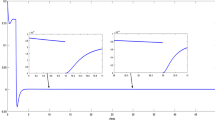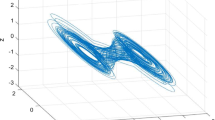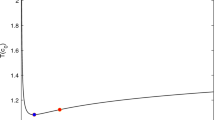Abstract
In this paper, input-to-state stability problems for a class of recurrent neural networks model with multiple time-varying delays are concerned with. By utilizing the Lyapunov–Krasovskii functional method and linear matrix inequalities techniques, some sufficient conditions ensuring the exponential input-to-state stability of delayed network systems are firstly obtained. Two numerical examples and its simulations are given to illustrate the efficiency of the derived results.






Similar content being viewed by others
References
Ahn CK (2010a) An H∞ approach to stability analysis of switched Hopfield neural networks with time-delay. Nonlinear Dyn 60(4): 703–711
Ahn CK (2010b) Passive learning and input-to-state stability of switched Hopfiled neural networks with time-delay. Inf Sci 180: 4582–4594
Ahn CK (2010c) \(L_2-L_\infty\) nonlinear system identification via recurrent neural networks. Nonlinear Dyn 62:543–552
Ahn CK (2011a) Some new results on stability of Takagi-Sugeno fuzzy Hopfield neural networks. Fuzzy Sets Syst 179: 100–111
Ahn CK (2011b) Robust stability of recurrent neural networks with ISS learning algorithm. Nonliear Dyn 65:413–419
Ahn CK (2012a) Switched exponential state estimation of neural networks based on passivity theory. Nonlinear Dyn 67(1): 573–586
Ahn CK (2012b) Linear matrix inequality optimization approach to exponential robust filtering for switched Hopfield neural networks. J Optim Theory Appl 154 (2): 573–587
Ahn CK (2012c) An error passivation approach to filtering for switched neural networks with noise disturbance. Neural Comput Appl 21 (5): 853–861
Angeli D, Sontag ED, Wang Y (2000) A characterization of integral input to state stability. IEEE Trans Automat Contr 45: 1082–1097
Arik S (2000) Stability analysis of delayed neural networks. IEEE Trans Cricuits Syst I: Fund Theory Appl 47: 1089–1092
Ensari T, Arik S (2005) Global stability analysis of neural networks with multiple time-varying delays. IEEE Trans Autom Contr 50: 1781–1785
Grujiá LT, Michel AN (1991) Exponential stability and trajectory bands of neural networks under structural variations. IEEE Trans Cricuits Syst 38: 1182–1192
Hong YG, Jiang ZP, Feng G(2010) Finite-time input-to-state stability and applications to finite-time control design. SIAM J Contr Optim 48: 4395–4418
Hopfield JJ (1984) Neurons with graded response have collective computational properties like those of two state neurons. Proc Natl Acad Sci USA 81: 3088–3092
Hopfield JJ, Tank DW (1986) Computing with neural networks: a model. Science (New Series) 233: 625–633
Horn RA, Johnson CR (1991) Topics in matrix analysis. Cambridge University Press, London
Huang H, Feng G (2009) Delay-dependent H∞ and generalized filtering H 2 for delayed neural networks. IEEE Trans Circuits Syst I: Reg Pap 56(4): 846–857
Huang T, Li C, Duan S, Starzyk J (2012) Robust exponential stability of uncertain delayed neural networks with stochastic perturbation and impulse effects. IEEE Trans Neural Netw Learn Syst 23: 866–875
Jiang ZP, Wang Y (2001) Input-to-state stability for discrete-time nonliear systems. Automatica 37: 857-89
Liu X, Cao J (2010) Robust state estimation for neural networks with discontinuous activations. IEEE Trans Syst Man Cybern Part B Cybern 40(6): 1083–4419
Matsouka K (1992) Stability conditions for nonlinear continuous neural networks with asymmetric connections weights. Neural Netw 5: 495–500
Sanchez EN, Perez JP (1999) Input-to-state stability (ISS) analysis for dynamical neural networks. IEEE Trans Circuits Syst I: Fundam Theorem Appl 46: 1395–1398
Sontag ED (1989) Smooth stabilition implies corprime factorization. IEEE Trans Autom Contr 34: 435–443
Sontag ED (1990) Further facts about input-to-state stabilization. IEEE Trans Autom Contr 35: 473–476
Sontag ED, Wang Y (1995) On characterizations of the input-to-state stability property. Syst Contr Lett 24: 351–359
Wu H, Feng W, Liang X (2008) New stability criteria for uncertain neural networks with interval time-varying delays. Cogn Neurodyn 2(4): 363–370
Wu X, Wang Y, Huang L, Zuo Y (2010) Robust stability analysis of delayed Takagi-Sugeno fuzzy Hopfield neural networks with discontinuous activation functions. Cogn Neurodyn 4(4): 347–354
Yang ZC, Hong YG (2012a) Stabilization of impulsive hybrid systems using quantized input and output feedback. Asian J Contr 14: 679–692
Yang ZC, Zhou WS (2012b) Input-to-state stability of impulsive hybrid systems with stochastic effects. In Proceedings of the 24th IEEE China conference on decision and control pp 286–291
Zhang HG, Wang ZS, Liu DR (2008) Global asymptotic stability of recurrent neural networks with multiple time-varying delays. IEEE Trans Neural Netw 19: 855–873
Zhu S, Shen Y (2012) Two algebraic criteria for input-to-state stability of recurrent neural networks with time-varying delays. Neural Comput Appl. doi 1007/s00521-012-0882-9
Acknowledgments
The work is supported partially by National Natural Science Foundation of China under Grant No.10971240, National Priority Research Project of Qatar under Grant No.4-451-2-168 and No.4-1162-1-181, Key Project of Chinese Education Ministry under Grant No.212138, the Program of Chongqing Innovation Team Project in University under Grant No.KJTD201308, Natural Science Foundation of Chongqing under Grant CQ CSTC 2011BB0117, Foundation of Science and Technology project of Chongqing Education Commission under Grant KJ120630. We also would like to thank the referee for valuable suggestions.
Author information
Authors and Affiliations
Corresponding author
Rights and permissions
About this article
Cite this article
Yang, Z., Zhou, W. & Huang, T. Exponential input-to-state stability of recurrent neural networks with multiple time-varying delays. Cogn Neurodyn 8, 47–54 (2014). https://doi.org/10.1007/s11571-013-9258-9
Received:
Revised:
Accepted:
Published:
Issue Date:
DOI: https://doi.org/10.1007/s11571-013-9258-9




